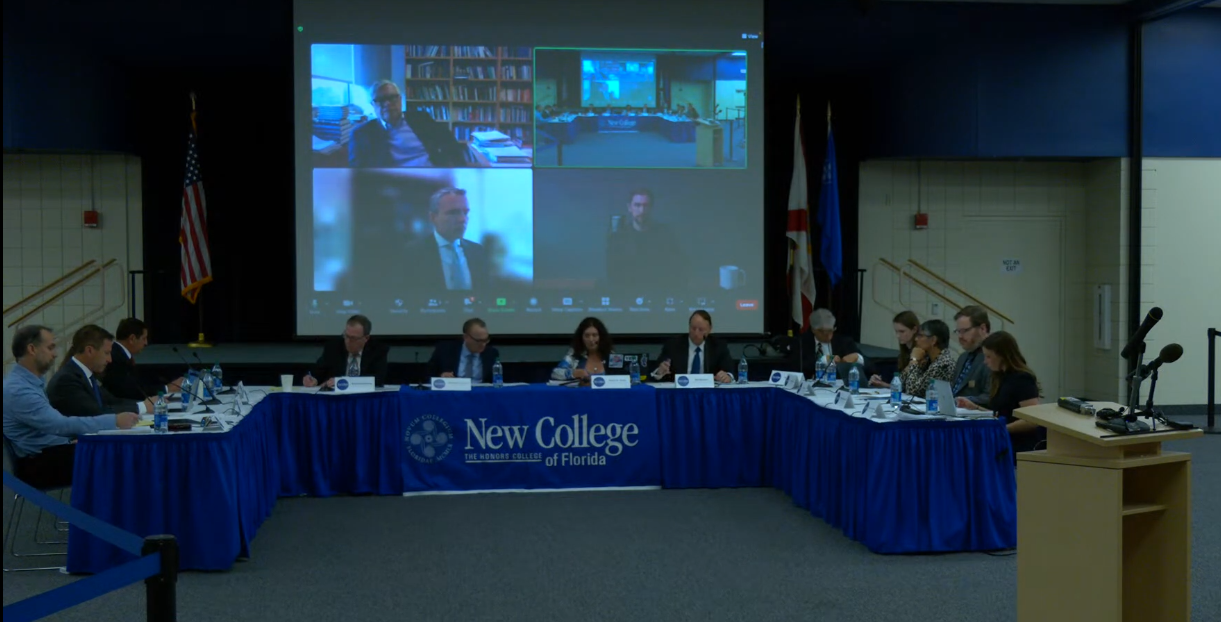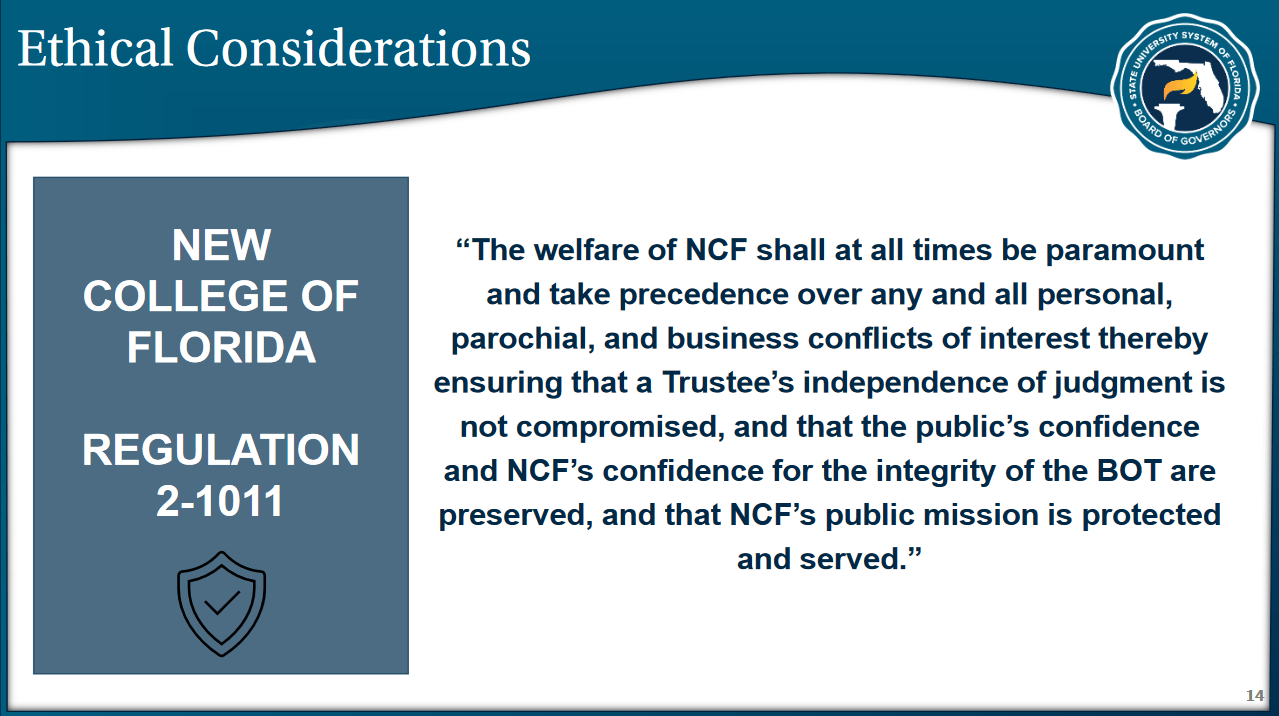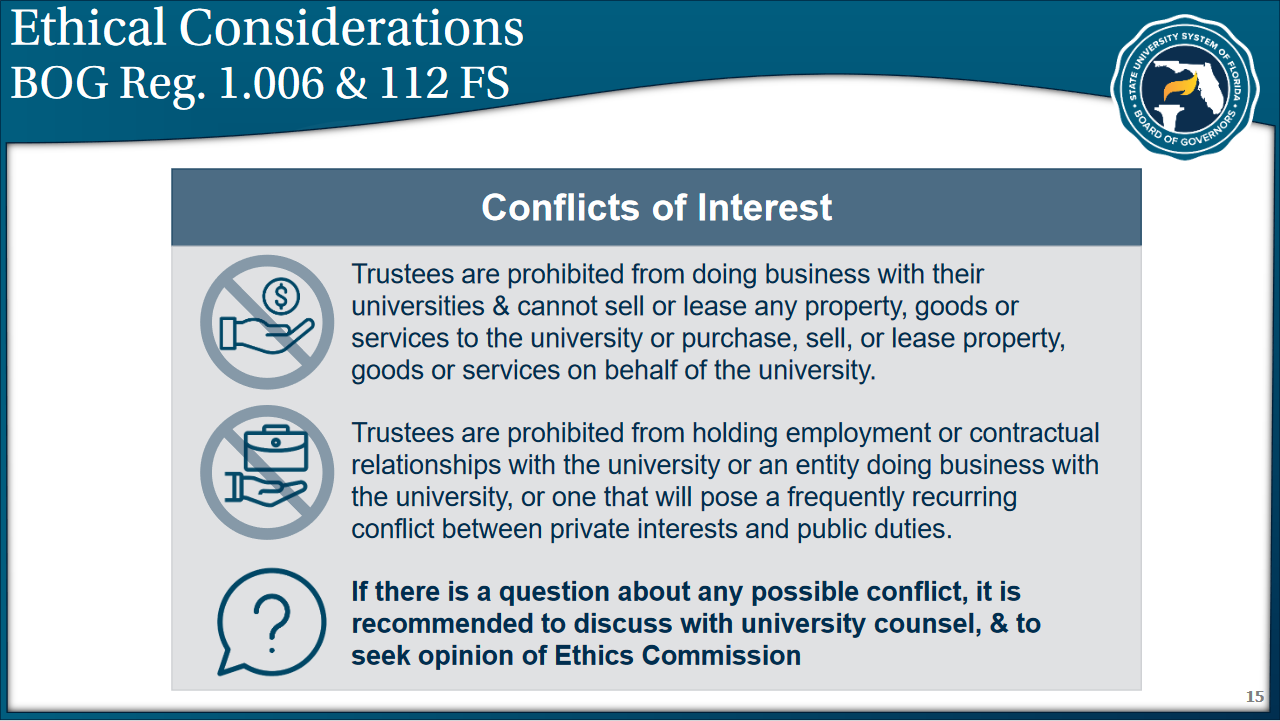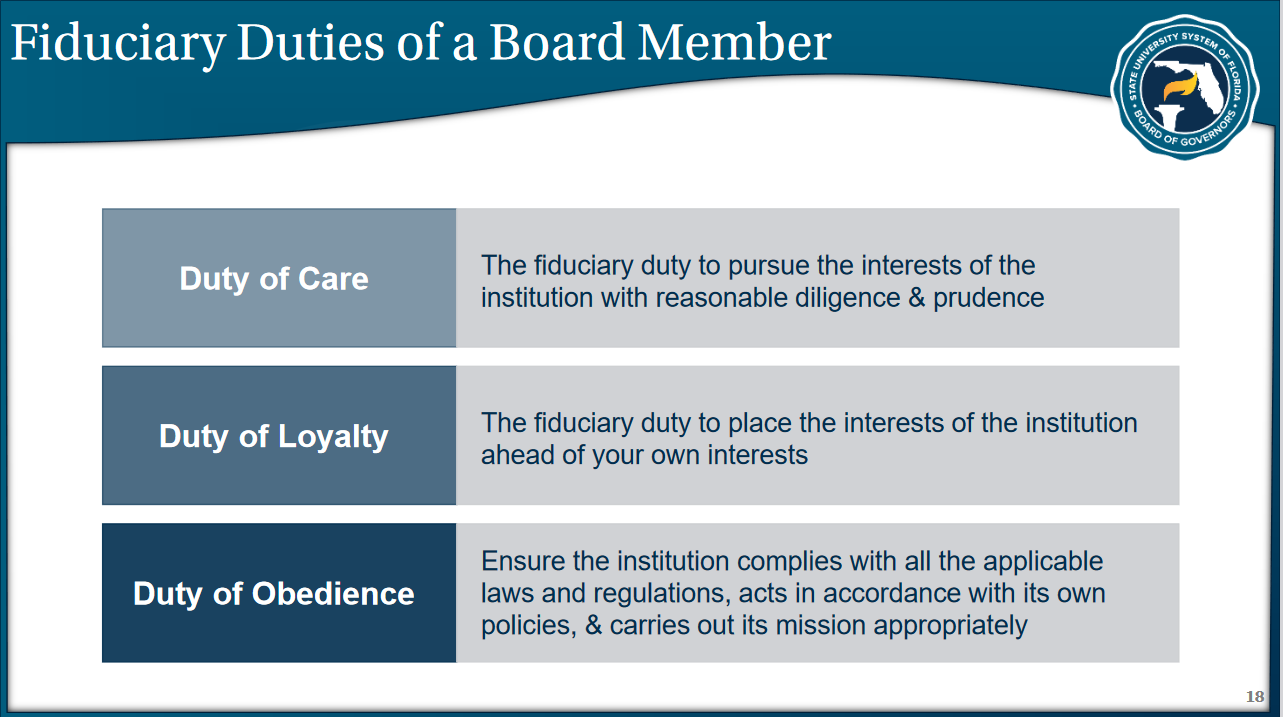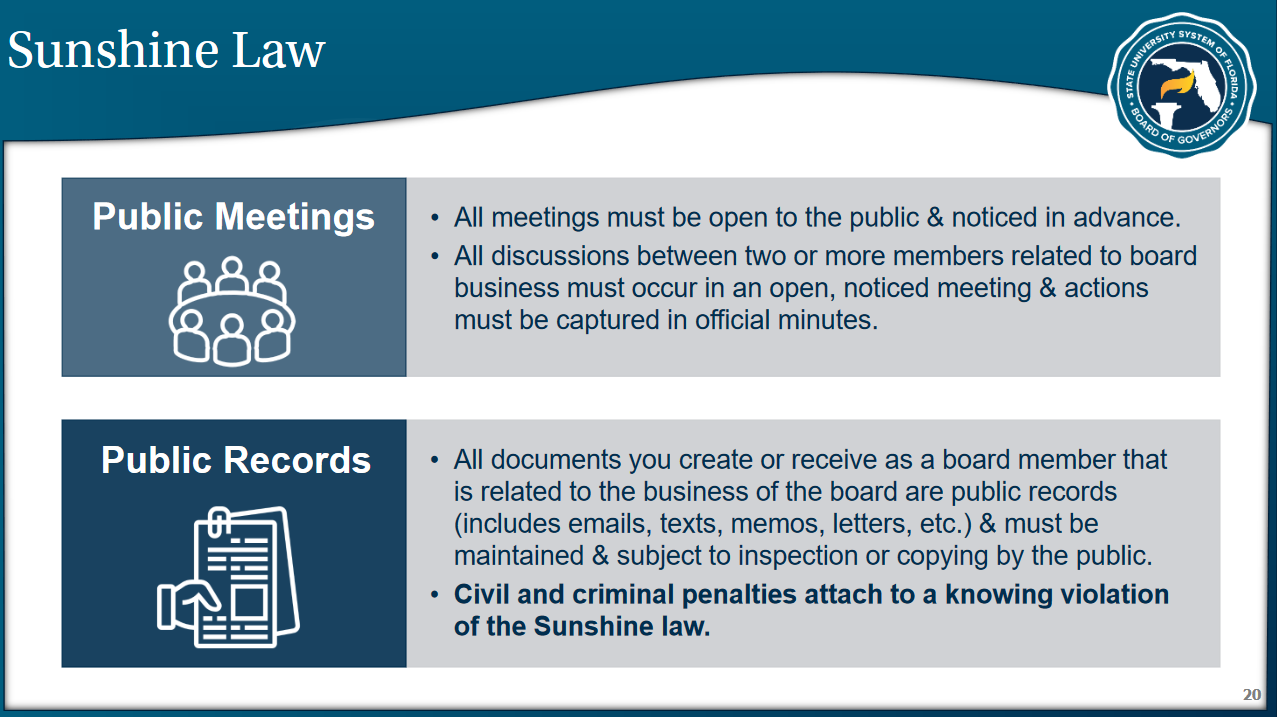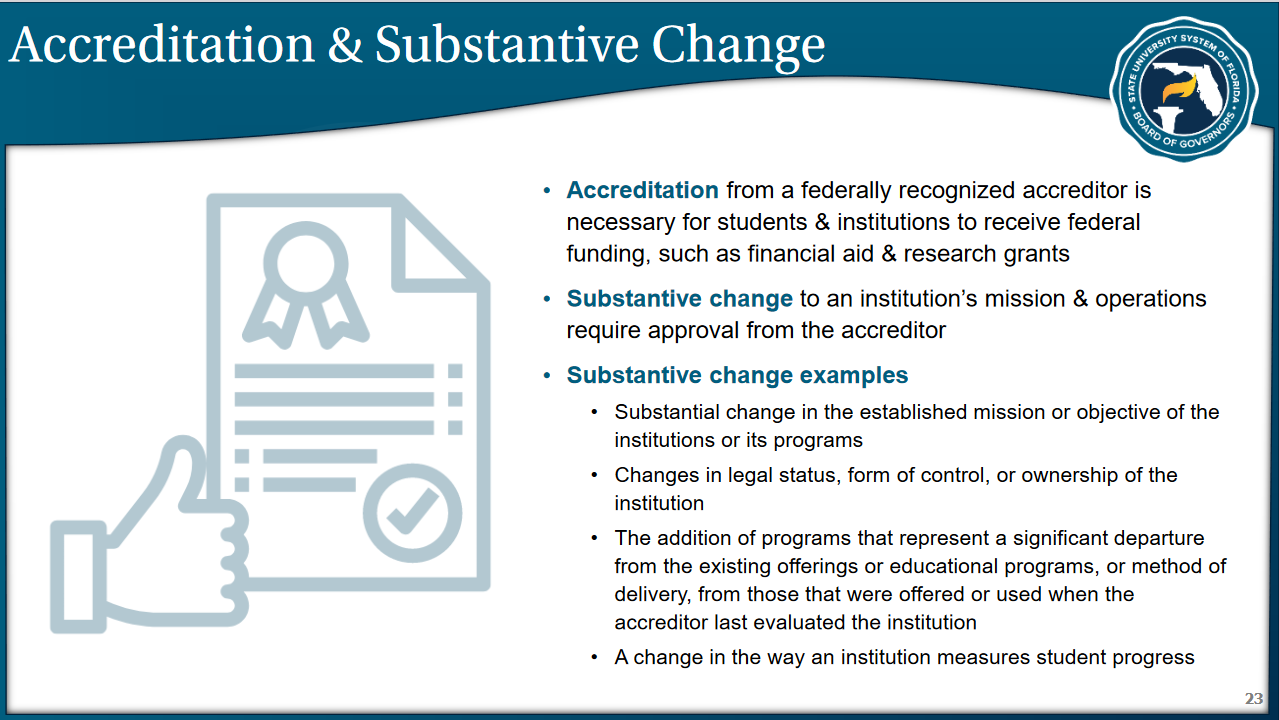Feb. 28 was a highly anticipated date for New College, as it marked Interim President Richard Corcoran’s second official day on the job and his first ever public address to the New College community during that day’s Board of Trustees (BOT) meeting. Also highly anticipated was the presentation on a series of revised proposals concerning diversity, equity and inclusion (DEI) initiatives on campus, titled “Implementation of DEI Changes.” Following this presentation, the board voted to eliminate the Office of Outreach and Inclusive Excellence (OOIE) and to remove the request for diversity statements from the Faculty Handbook. A full discussion of this agenda item appears below.
The Feb. 28 BOT meeting was bigger than its predecessor on Jan. 31 in nearly every way—a larger in-person audience, increased security before and during the meeting and a public comment section that lasted nearly an hour, reflecting the ever-growing controversy surrounding many of the trustees and Corcoran. With both a new BOT and a new Interim President now working in tandem, the New College community is waiting to see how much more of the proposed “classical liberal arts” education initiatives will descend upon their school in the coming months.
Call to Order
The Feb. 28 BOT meeting was held in-person and live streamed from the Sudakoff Conference Center from 1 p.m. to approximately 4:30 p.m. More than 300 seats were reserved for the public, as compared to the approximately 100 seats that had been reserved when the BOT had last met in person.
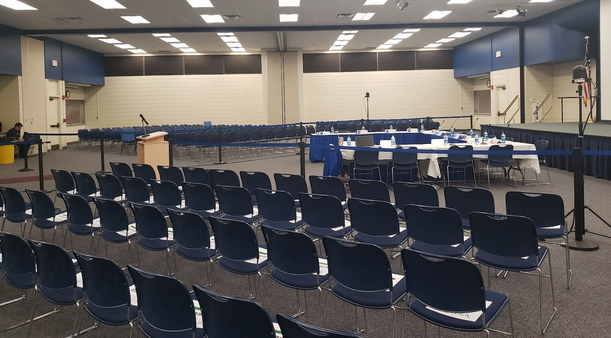
All 13 trustees were in attendance, but Trustees Christopher Rufo, Dr. Ryan T. Anderson and Dr. Charles R. Kesler all participated via Zoom. Anderson had frequent audio issues throughout the meeting. The trustees were also joined by Corcoran, Associate Vice President Christe Fitz-Patrick and new General Counsel Bill Galvano, who assumed his position the previous day.
The meeting began with both a prayer and the Pledge of Allegiance—a first-time combination for New College BOT meetings. Prayer was led by Pastor Carl Dixon from Calvary Chapel Sarasota.
“Oh dear God, make New College a place where there is great learning, where minds are challenged and grow in knowledge,” Dixon said. “A place where young or not so young can come and grow in knowledge, to think through what they believe and find freedom in being curious and respectful about what others believe. Father, I pray for the trustees to meet wisely as they encourage teachers and staff at this place of learning.”
Before formally calling the meeting to order, Chair Debra A. Jenks welcomed Corcoran and said that she wanted to “reaffirm the mission of this board, and that is to rehaul this tiny, small, special institution into what it should be, which is the paradigm of academic and educational excellence.”
“It is,” called out a member of the audience.
BOG Presentation
The first item on the agenda was a presentation given by Board of Governors (BOG) member Alan Levine. More formal trustee training will occur in November, which Levine explained is necessary every time there is a large turnover in trustees. At the request of former BOT Chair Mary Ruiz before the Jan. 31 meeting, Levine had prepared a preliminary orientation.
This presentation included an overview of the basic organizational structure of both the BOG and BOT, the roles of the BOT Chair and President and some of the guidelines placed upon the board. These include developing a strategic plan, adopting a policy to address conflicts of interest and ensuring campus safety. Levine spoke particularly about how the board must function as a unit, and how “no one person on your board has any more power or authority than another member.”
Later, Levine elaborated with an example: “When a board member comes on campus and starts giving direction to staff or faculty or assuming authority they don’t have, in effect, they’re stepping on the toes of every other board member who might not agree with what that person is saying or doing.” This comment was met with snaps of approval from the audience.
The presentation also included segments about ethical considerations, fiduciary duties and the Sunshine Law.
“None of you are here representing anyone in particular, except for two people: the Student Body President represents the student body and the Faculty Representative represents the faculty,” Levine said. “The fiduciary responsibility of every board member, at all times, is to put the interests of New College ahead of anything else.” This final sentence was met with more snaps from the audience.
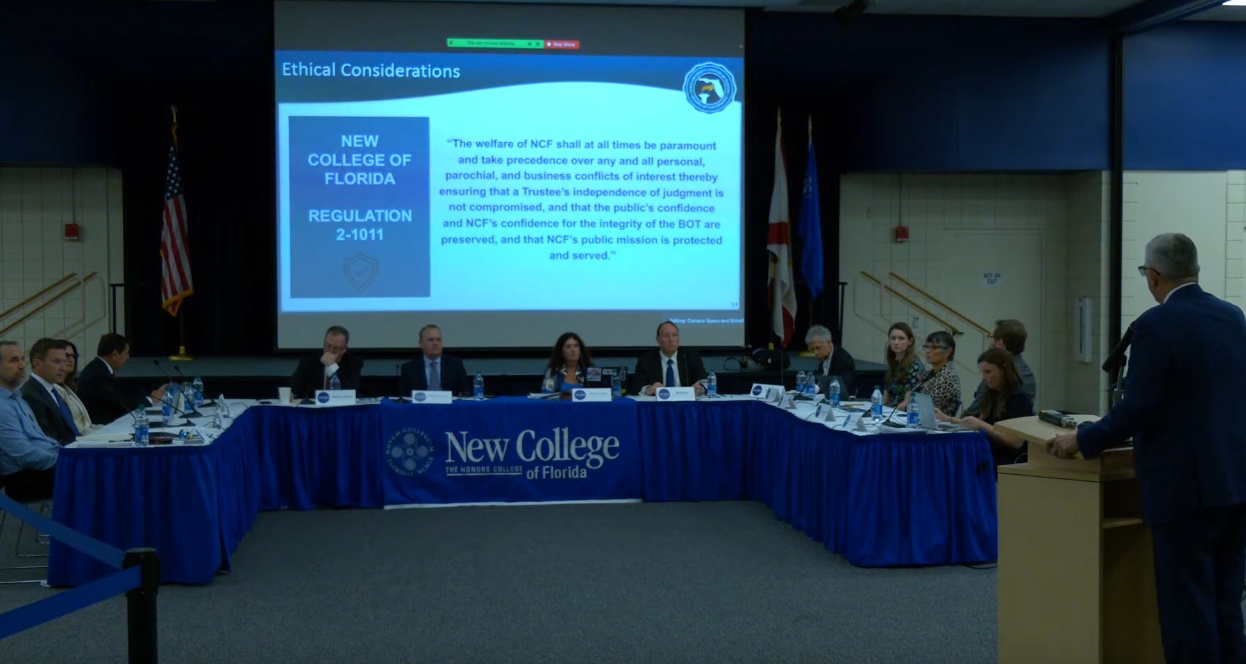
Levine’s presentation also elaborated on the various fiduciary duties of the BOT, which include doing “the appropriate homework to make sure you have all the information” before a meeting—an omission that some trustees had been called out for by former Chair Ruiz during the Jan. 31 meeting. Levine also discussed accreditation, and how an institution cannot change its current accrediting body while its accreditation is at stake, provoking sardonic laughter from the audience. For New College, the accrediting body is the widely respected Southern Association of Colleges and Schools Commission on Colleges (SACSCOC).
”As the governing body, you are responsible for the well-being of this entity,” Levine said, followed by snaps. “And so, if you can’t put the interest of this institution ahead of your own, you really ought not be in this role.”
Following the presentation, Ruiz asked Galvano to provide the board with “some guidance on the use of social media. We always want to be above board and not personally benefiting financially from our role as a trustee.” Galvano said that he will work to establish some parameters.
Rufo in particular is alleged to be in a potentially compromising position when it comes to these regulations, as within the two months of his appointment as a trustee he has produced myriad content related to New College for both his Twitter and YouTube accounts related to New College. He produced two videos that included content from the two Jan. 25 sessions Rufo held with students and faculty, and another video with content both from the Jan. 31 BOT meeting and the community protest that occurred on the same day. In this video, Rufo provides commentary for X González’s (‘22) speech during this protest, and describes it as “left wing Mad Libs” with “unregulated emotional appeal.”
Public Comment
Before public comment could commence, Trustee Jason “Eddie” Speir asked Jenks whether he could respond to each public comment once it was given. Jenks said no, but when Speir continued to ask, she told him that “we can do trustee comments at the end,” despite the item not being on the agenda. These trustee comments never came to pass, however, perhaps due to the length of the public comment session.
Forty people in total presented public comment, with one written comment that was not read aloud during the meeting but was recorded for the record. This is the largest number of public comments at any BOT meeting since the new board members were appointed. 10 of the speakers were current students, two were current faculty members, one was a former faculty member and the remainder were either community members, alumni or parents of current students.
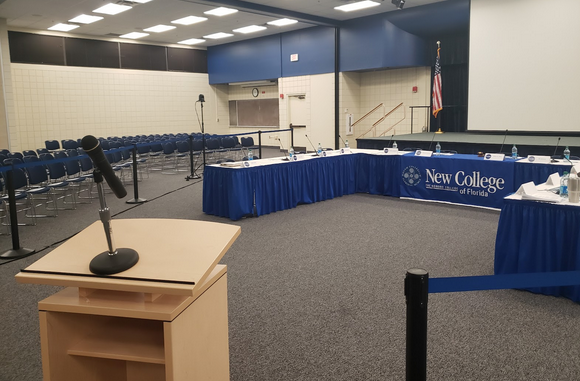
One of the recurring topics during the public comment portion was support for the OOIE, something that Associate Professor of Biology Elizabeth Leninger spoke about.
“At the last meeting, one of the trustees asked you to vote to eliminate the entire office,” Leninger said, referring to Rufo and his initial “Abolish DEI Bureaucracies” proposal. “He did no research on what functions that office provides, and did not even bother to write a proper motion. Does this trustee have the intellectual skills and fiduciary duty to serve New College? Or, as he has admitted to the media, is he merely a soldier of rhetoric in DeSantis’ army?”
Admissions Student Ambassadors and thesis students Rocío Ramírez Castro and Chloë-Arizona Fodor read a prepared statement on behalf of the Admissions student employees. Ramírez Castro read the first half of the statement, which focused on the negative effects that the actions and social media presences of certain trustees have had thus far on New College’s reputation and recruitment efforts.
“Within the first three weeks after the [Jan. 31] BOT meeting, we received over 100 calls to our front desk from prospective students and their families saying that they either were interested in attending New College but are not anymore, or that they had already paid their enrollment deposit, but wish to withdraw it,” Ramírez Castro said. “They reference the changes proposed by the new members of this board and threats to academics and DEI programming. We must answer question after question about the future of the school that we attend, with some questioning whether our degrees will even be accredited when we graduate.”
Fodor read the second half of this statement, which emphasized the “profound and alienating impact on the marginalized members of our community” that the board has had.
“In admissions, we see students entering higher education from a variety of backgrounds, and we firmly vocalize our support for the work that offices like the OOIE conduct in supporting students as they integrate, acclimate and continue to celebrate their identities in a new community,” Fodor said. “The rampant misinformation being spread about subjects such as Critical Race Theory (CRT) in our coursework profoundly misconstrues the intersectional, factual and historically centered priorities of our educational program.”
Similarly, the hostile learning environment that the BOT’s actions have contributed to was another recurring point of discussion, as expanded on by Elisa Mitchell, whose son is a current New College student looking to transfer.
“If he leaves, it won’t be because he’s some kind of snowflake who ‘can’t hack it,’ as some of you like to imply when you mock New College students on your social media,” Mitchell said. “It will be because the style of leadership that the new majority of this board has demonstrated is not a model that garners admiration or respect.
“You tell people here that they’re a failure, that their culture must change and you make them feel like their children’s education and even safety is at risk, and then you marvel that they’re angry,” she continued. “And you point to that anger as a sign of unreasonableness and lack of intellect. I wonder how you think you could be successful with this kind of approach.”
The topic those delivering public comment expressed with the most frequency was an overwhelming disapproval of Corcoran—with many continuing to cite his large salary as approved by the BOT on Feb. 21.
“We do not welcome you here because you do not reflect the values of the New College community, and you do not respect the people here who have poured their blood, sweat and tears into this institution,” thesis student KC Casey said, referring to Corcoran. “It’s an insult for you to swoop in and grift an easy $700k plus benefits while the board claims that our school is in a financial crisis and underpays the faculty, staff and student employees who will continue to keep this place functioning while you’re spending half your time working from home in your Tampa residence.”
Others directed their disapproval to more specific members of the board.
“I would like to thank the puppet trustees for being so stupid, and Corcoran the pretender for being so nakedly greedy,” Jinx Ashforth (‘05) said. “The real lesson is here, students, at their expense, as Rufo tweets throughout what he mistakenly believes is his personal glow-up moment rather than taking his responsibility here seriously. As Spalding uses his speaking spell to research the word ‘collegial’ and confuses friendship with the likes of him as qualification for anything. As Jenks promises that donors will refill the coffers she raids, though she won’t name them and somehow they can’t pay Corcoran upfront.”
One notable speaker was Reverend Dr. John Dorhauer from the United Church of Christ (UCC)—the very same church that helped to found and fund New College in 1960.
“When Martin Luther King Jr. said that the moral arc of the universe is long but it bends towards justice, he did so to warn us against sycophants like you, to inspire the kind of resistance that we see erupting on this campus right now,” Dorhauer said.
Once the final public comment had been delivered, a chant of “shame on you” arose from the audience. The chanting stopped once Jenks addressed the audience, saying that “we have a meeting to run here and you will be removed,” while gesturing towards the various security personnel in the room. Many audience members left shortly after public comment had concluded.
Consent Agenda and Committee Assignments
The consent agenda for this meeting involved approving the minutes from the Jan. 31, Feb. 13 and Feb. 21 BOT meetings, but also involved the approval of minutes taken during the event Rufo orchestrated on Jan. 25. Ruiz asked that both the Jan. 25 and Jan. 31 meeting minutes be moved to discussion. Jenks approved this and the board voted to approve the minutes for both February meetings.
Ruiz explained that she had submitted written remarks as Chair for the Jan. 31 meeting and wanted them to be included before the minutes were approved. A motion was made to adopt these minutes as revised and passed. However, Ruiz’s issues with the Jan. 25 minutes were more complicated: she said she had not been made aware that a meeting was called and received no notice. This incited murmurs from the audience, and more than once Jenks and Galvano began whispering to each other away from their microphones.
The meeting in question was the two sessions Rufo held with faculty and students in the Mildred Sainer Pavilion on Jan. 25. Rufo had initially advertised this event to the New College community five days prior via email as “an informal conversation” and not an official BOT meeting. Rufo brought his own media team to this event.
Jenks stated that because Trustee Speir and Trustee and Faculty Representative Matthew Lepinski were also present, and the event was “promulgated, I believe, in advance,” it had warranted official meeting minutes, written by Fitz-Patrick.
These meeting minutes are very brief, and identical for both the student and faculty sessions: “Trustee Lepinksi introduced Trustees Rufo and Speir. Trustee Rufo went over the general terms of the meeting and provided comments. Trustee Speir provided comments. Trustees Rufo and Speir took questions from the audience.” To date, the full content of these sessions does not appear to have been recorded or made public.
Vice Chair Ron Christaldi suggested that this event did not count as an official meeting because there was no agenda and it was not open to participation by other trustees. After further discussion, Galvano said that notice of the meeting had still been given and “trustees [came] together and exchanged comments and ideas” in a way that was in accordance with Sunshine Law. Additionally, since no formal action was taken and no votes were cast, he suggested that the minutes did not need official approval. These minutes were removed from the agenda.
Jenks then gave a brief update on the membership of the five BOT Standing Committees. While committee membership and leadership was not discussed during this meeting, the Feb. 28 BOT meeting agenda shows that Jenks appointed the following trustees as Chair of each committee: Dr. Lance Karp as Chair of Audit and Compliance; Dr. Mark Bauerlein as Chair of Academic, Student and External Affairs; Christaldi as Chair of Finance and Administration; Jenks herself as Chair of Presidential Evaluation; and Trustee Dr. Matthew Spalding as Chair of Strategic Planning.
At this point, the BOT meeting had been ongoing for about two hours, and so Jenks called for a break that lasted 18 minutes.
President’s Report
By the time that break concluded, over half of the audience had left. At this point, it was time for Corcoran to deliver his very first President’s Report—and his first public address to the New College community.
Corcoran began by thanking Gov. Ron DeSantis for the $15 million for New College approved by the Joint Legislative Budget Commission on Feb. 15, a statement received with laughter from the audience. Corcoran also gave thanks to the New College BOT, calling it “second-to-none,” which inspired a similar exasperated audience reaction.
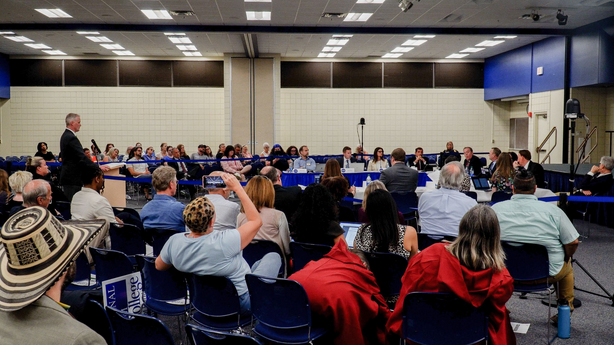
In terms of his priorities as Interim President, Corcoran said student recruitment initiatives are something he hopes to implement immediately, and, “We have great opportunities through the Admissions process to go out there, build our recruitment, build our argument why students should make New College their first choice.” Another priority involved filling vacant “key positions” at New College, although he did not specify these further.
Corcoran also spoke about wanting to review the courses at New College.
“We would like to look at all of the classes that are offered—the mission, the vision—and go through that, and come back with all of your input,” he said. “Obviously we have faculty members here who are authors—distinguished, in so many ways, and who have great affiliation and knowledge of a liberal arts institution.”
At no point did Corcoran specify the purpose of this, or what sort of mission or vision he aims to curate, only saying that his goal is to “see where it is that we can make the student life experience even better.”
Corcoran also explained that he had the opportunity to visit campus “about six times” during the month of February, and that he is interested in addressing issues such as food scarcity and “maybe adding some additional extracurricular activities.” To do this, he expressed plans to fundraise in Tallahassee on Mar. 7 through 9 for the opening week of the legislative session. He concluded his report by explaining that he had recent difficulties contacting the New College Foundation. Trustee and Student Representative Grace Keenan had reported similar difficulties at the Feb. 21 BOT meeting when she spoke of her frustration in attempting to learn more about the funds for Corcoran’s salary.
“Implementation of DEI Changes” Proposal
The next agenda item was to review the “Implementation of DEI Changes” draft policy, presented by Chief of Staff and Director of Institutional Performance Assessment Bradley Thiessen. This proposal was a revised version of the original “Abolish DEI Bureaucracies” proposal brought to the board by Rufo on Jan. 31. Trustees noted that the original proposal had not actually been written with New College in mind, and most controversially, proposed the elimination of the entire OOIE without considering the financial aid services and community outreach programs this office also provides. In response, the board voted to direct staff to conduct further research on DEI initiatives on campus and to revise Rufo’s plan.
The new document Thiessen presented to the board was divided into four categories, each one a modified version of Rufo’s initial four proposals. Each proposal included an analysis of the current situation, actions that have been taken and recommended next steps for the BOT.
Proposal 1: “Abolish DEI Bureaucracies.” Approved
Proposal 1 identified that among four staff members and three student employees, only one person held a position related to DEI in the OOIE: Dean of DEI and Chief Diversity Officer Yoleidy Rosario-Hernadez. This position involves fulfilling the BOG-required Equity Report and Civil Discourse initiatives, overseeing outreach efforts and mediating conflict. The other three staff positions have to do with Access Leadership, Community Outreach and Program Coordination. The students working in the OOIE manage grant work and social media for the office. The OOIE has a total budget of $442,227.
The recommended action included in the proposal was to transfer OOIE staff into open positions in other offices on campus in order to improve other student services. The three staff members with non-DEI related positions would retain their basic job titles and duties in other departments also related to financial aid, campus engagement and institutional research. Rosario-Hernadez’s job title would be changed to Associate Dean of Housing and Residential Life in Student Affairs. With this, the OOIE could be eliminated while still retaining its essential functions in other departments. This would also save New College more than $250,000, Thiessen said, although it was unknown how much money in the OOIE had been spent specifically for DEI-related initiatives.
Recommended next steps for the BOT included careful examination of legal regulations and implementing a definition of DEI, which would include “any effort to manipulate or otherwise influence the composition of the faculty or student body with reference to race, sex, color or ethnicity, apart from ensuring colorblind and sex-neutral admissions and hiring in accordance with state and federal anti-discrimination laws.”
Thiessen clarified that the Equity Report had, in the past, also been filled out either by himself or by Human Resources (HR), but that the matter of who or what office would complete it in this proposal were to be adopted would need “a more careful review.”
Spalding made a comment about the purpose of this proposal to “surgically separate” legal requirements of the school from DEI-related initiatives, which he referred to as both “objectionable” or “discriminatory.”
“Especially this section here concerning definitions,” he said. “It must not be the official position of the college to advance those matters that we are trying to remove here. It doesn’t have anything to do with opinions, other places on the campus, this is the official position of the college.”
“From my understanding, we haven’t, as a board, decided what specifically is discriminatory or objectionable,” Keenan responded, which was met with snaps from the audience. “We were getting this presentation to learn more about this office, to understand how it connects to the legislation Trustee Rufo brought, but from my understanding, we have not decided—”
She was then cut off by Spalding, who continued to say that the board had given staff “direction as to what the things that are objectionable.
“It [the proposal] makes the distinction between efforts to manipulate or otherwise influence the composition of faculty or student body with reference to race, sex, color or ethnicity, apart from ensuring colorblind and sex-neutral admissions and hiring in accordance to state and federal anti-discrimination laws,” Spalding said. “I think that’s a pretty straightforward definition.”
“No, it’s not,” came multiple calls from the audience.
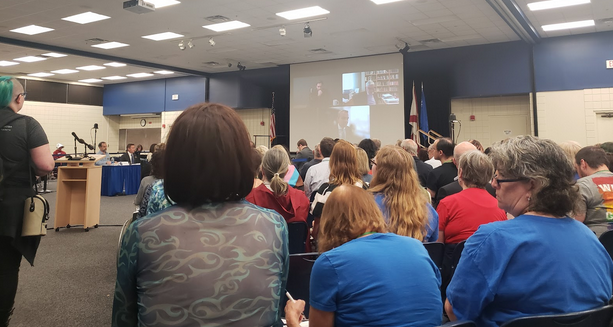
Proposal 2: “End mandatory diversity training.” No vote
All mandatory training sessions for staff and faculty from the past several years were evaluated, and only one was found to involve DEI initiatives: “Workplace DEI in Action,” an annual one-hour virtual training session that Thiessen reported only 25-30 percent of employees would complete each year, with no action taken against those who did not complete it. This training has been removed from the list of mandatory training modules.
Thiessen found that in 2021, the Campus Police Department (CPD) supervisors also completed a 14-hour Certificate in DEI in the Workplace, but this certificate had been offered through the University of South Florida (USF) and no further DEI-related training involving the CPD has occurred since then.
A proposed next step for the BOT was to direct campus leaders to adopt a policy in the Employee Handbook to prohibit mandatory diversity training for employees. This would not apply to academic courses offered for credit or to any registered student organizations, “affecting only its members according to the definitions in the previous proposal,” Thiessen said.
Proposal 3: “Curtail Political Coercion.” Approved
This proposal dealt with mandatory diversity statements, and found that while they have never been required for staff, they recently became a part of the “pre-search” process to hire regular, full-time faculty. Faculty Handbook Section 5.2.2.1 states that one of the steps each search committee should follow while gathering a pool of applicants is to request “a statement regarding the candidate’s contribution to, or approach to, achieving diversity.” Open faculty position advertisements also include a diversity statement as one of the listed documents needed to apply.
This requirement has been removed from the three open faculty position advertisements where it appeared, and Thiessen said that HR staff have also been instructed to withhold from the search committees any diversity statements that applicants do submit. Recommended next steps for the BOT were to modify Section 5.2.2.1 of the Faculty Handbook to remove the request for a statement “regarding the candidate’s contribution to, or approach to, achieving diversity.”
Proposal 4: “End Identity-Based Preferences.” No vote
For this fourth and final proposal, Thiessen identified all potential areas where identity-based preferences could arguably apply to New College’s admissions or employment processes. He reported to the BOT that the factors considered when a student applies to New College include their application, transcripts, test scores and an essay. The essay is not scored based on content, but on writing ability and metacognition. There are “plus factors” that apply to certain applicants—for instance, first generation students, multilingual students and out-of-state and international applicants, or applicants from a rural Florida county. Thiessen said that these could arguably correlate with identity metrics, “but it didn’t seem like that was what anyone was shooting for. I didn’t see anything worrisome with that practice.”
“I do conclude that New College does not have an identity-based admissions process,” he continued. “There’s no quotas. As Trustee Ruiz pointed out, we have an Equity Report, though, where we set goals going forward.”
Thiessen also found that there are no identity-based requirements for employment or anything that could be conceivably argued as an identity-based requirement. Similarly, there are no quotas, but the BOT is required to approve an Equity Report. Reviewing the goals of these reports are the recommended next steps put forward by this proposal.
Speir asked Thiessen what these goals currently look like. Thiessen answered that the BOT sets the goals and that they include race, ethnicity and gender categories for how many students are enrolled, for retention and graduation rates, and for faculty who are awarded tenure or promotion. Speir asked whether there was “anything to allow us to remove that as a goal,” to which Thiessen reminded him that the Equity Report is required by the BOG.
Discussion and Vote
Rufo submitted two motions: one to eliminate the OOIE as outlined in Proposal 1, and the other to “authorize the Interim President to make necessary or appropriate personnel decisions.” Speir quickly seconded it. At no point during the meeting was the second half of this motion expanded upon.
Jenks then allowed Keenan to make a comment.
“From my understanding, what this presentation showed was that one-fourth of one office on campus has a position related to DEI,” Keenan said. “On campus, we do almost no [mandatory] DEI training, and the ones that are mandatory are frequently not done, and of the ones that are done, it’s only one hour of training. The only recently-added DEI statement is the only DEI statements that are required, and we have no identity-based quotas. This is not a very impressive DEI bureaucracy, is what I’m saying.” This inspired applause from the audience.
Rufo cut in to say, “Then there should be very little resistance to eliminating it,” but Jenks told him “one second” in order to allow Keenan to continue.
“It seems like we have spent more time and resources to find out what DEI we do, than we are on doing actual DEI,” she stated. “What I would like to ask is, since this came from a motion originally from Trustee Rufo, can you clarify what the issue is with DEI, just so we can inform our decision on this motion?”
“I’m actually quite happy to see this report, to see what the status quo is, and for those who are concerned about disruption—this is really not as great of a disruption as even, maybe, really I would have predicted,” Rufo replied. “But these are decisions made on principle. And I think the board has a mandate from the people of Florida, who have appointed us through their elected representatives, to make sure that we are embodying the most important principles, and DEI goes against those principles because it restricts academic freedom, it degrades the rigor of scholarship, it treats people differently on the basis of their skin color or other inborn identities, and then it also, unfortunately, restricts an open and civil debate on campuses.”
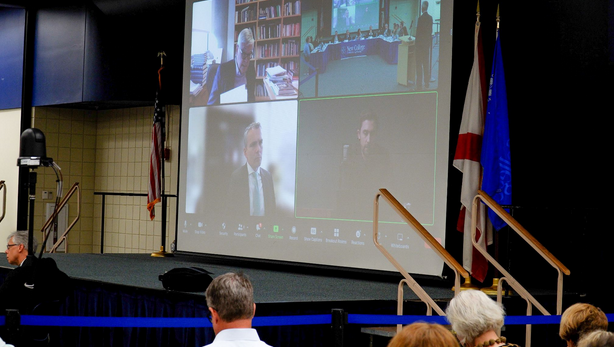
Lepinski followed up on Keenan’s observation that DEI-related initiatives do not in reality play a significant role in New College bureaucracy, and questioned whether “we’re solving a problem that isn’t serious or doesn’t really exist” by choosing to disband the OOIE. Spalding then reiterated Rufo’s claim that dismantling the office is a “matter of principle.”
“This is discrimination, it should be gone,” Spalding said.
“It’s inclusion,” a member of the audience shouted. “Discriminating against who?” another audience member asked.
Keenan questioned Spalding’s use of the word discrimination and whether any legitimate discriminatory practices had taken place at New College through the OOIE. “I just don’t understand where the connection is. Are we actually discriminating against anyone at this school, and—”
Spalding cut her off, prompting uproar from the audience. “I think the problem [is] that this is an ideological movement. It’s a political argument that you can agree with as much as you want, or disagree with. My point is that it has no place in the policies of a liberal arts college. [With] DEI, those very terms get turned around to mean the exact opposite, and now it’s an argument that we should recognize someone’s status and benefits based on the color of their skin. That is discrimination, by definition.”
Keenan argued that “the DEI that we do here is properly done, and it doesn’t encourage inclusion and we don’t discriminate against people, from my experience here.” She then asked if any of the trustees have ever been to the OOIE. This was followed by several seconds of silence from the board, which was then followed by applause from the audience.
“Is that next to the library?” Speir asked. The OOIE is located in College Hall.
Bauerlein then interjected to discuss the request for a diversity statement from faculty in the Faculty Handbook.
“The presence of the DEI statement in job applications is a serious infringement on academic freedom,” he said. “The terms diversity, equity and inclusion are loaded terms. They carry a lot of political, ideological content. And to put them into a job application—I take that as a very serious issue. It forces faculty to start conceiving themselves as ideological agents if they want to get a job.”
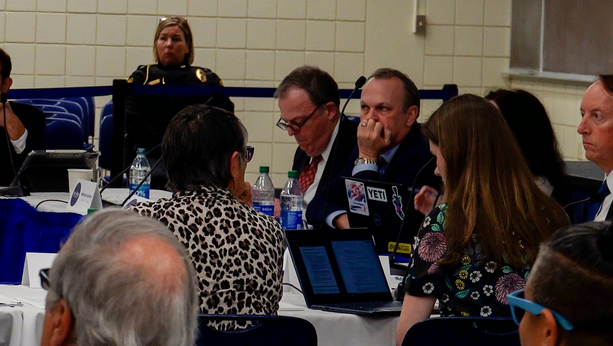
There was further discussion aimed at clarifying Rufo’s proposed motion, especially to “authorize the Interim President to make necessary or appropriate personnel decisions.” Corcoran himself suggested that the motion be amended to authorize him to follow through on the steps recommended in Proposal 1, inclusive of eliminating the OOIE and making any necessary personnel decisions. Rufo agreed to these terms and Speir re-seconded the motion.
The motion passed 10-3 with Keenan, Lepinski and Ruiz as the dissenting voices. Anderson’s audio cut out during this vote, and he could not be heard or seen making any kind of gesture to indicate his preference. Even so, the BOT moved on as though he had voted.
Rufo made a second motion “to authorize the Interim President to amend section 5.2.2.1 of the Faculty Handbook to eliminate the request for ‘a statement regarding the candidate’s contribution to, or approach to, achieving diversity,’” as outlined by Proposal 3. This was also seconded by Speir. A second roll call vote commenced and this motion was also approved 10-3, with Keenan, Lepinski and Ruiz as the dissenting votes.
Bauerlein then made a motion to “direct the Interim President to adopt a policy within the employee handbook that prohibits diversity training for employees.” Rufo seconded it. After some discussion on the grounds that this motion did not provide Corcoran with the appropriate flexibility, it was withdrawn. Spalding replaced it with, “Direct the Interim President to adopt if he chooses a policy in the Employee Handbook that prohibits diversity training from employees.” Speir seconded this new motion.
Corcoran pointed out that Spalding left the word “mandatory” out of this new motion. Spalding clarified that this was intentional and that he was moving to allow the President to prohibit all diversity training at his discretion. “Whether they are mandatory or not, they still violate our non-discrimination policy.”
Further discussion ensued revolving around Corcoran’s power of discretion and whether or not a vote was needed to determine this. Galvano confirmed that a vote from the BOT would not be needed to grant Corcoran the discretion to implement Proposal 2 when he already possesses it. The motion was once again withdrawn.
“The first two motions are clear and I think that, on the advice of counsel, the flexibility exists for me to take action when necessary on the third issue,” Corcoran said. “And my intention is to review all of that stuff.”
Status of NCUFF Collective Bargaining Agreement
Immediately before the next agenda item was announced, Anderson left the Zoom call and did not return. It is unclear whether or not this was due to technical issues, as no other members of the board addressed it.
The “Status of the New College of Florida United Faculty of Florida (NCUFF) Collective Bargaining Agreement” had been deferred from the Jan. 31 BOT meeting. Approving this agenda item would issue a one-time corrective payment to select faculty members who did not receive a single additional bi-weekly payment, which is customary for all other state university system (SUS) schools to offer once every 11 years due to the odd calendar days in different years.
“I have taken up discussion and consideration of the NCUFF item and decided that we cannot address it on this agenda at this time in accordance with legal guidance,” Jenks said. She elaborated that while former President Patricia Okker had made these negotiations previously, “there have been significant changes since those negotiations,”and so directed Corcoran to go back to the bargaining table with NCUFF “as quickly as possible.”
“I appreciate the need for speed in this matter, because the cost of living is going up quickly in this area and faculty members have been expecting a cost in living increase,” Lepinski said.
He then suggested that Jenks designate time for interested trustees to consult with Corcoran and whomever he designates as the chief negotiator to ensure that for the next BOT meeting, a proposal is brought to the board they will approve of and the item is not deferred further. The consultation outside of the Sunshine that Lepinski referenced is Section 447.605 of the Government-in-the-Sunshine Manual, which makes an exemption for “discussions between the chief executive officer of the public employer, or his or her representative, and the legislative body of the public employer relative to collective bargaining.”
“So the faculty can negotiate behind closed doors, and that’s what we’re being accused of doing?” Spalding asked, referring to the current accusations against select members of the BOT for violating Sunshine Law.
Lepinski clarified that an exemption exists, and Galvano said he would look further into it. There was no vote on this item.
Updates to 2022-23 Operating Budget
Finally, the BOT reached its final agenda item of the meeting: updates to the 2022-2023 Operating Budget, presented by Vice President of Finance and Administration Chris Kinsley.
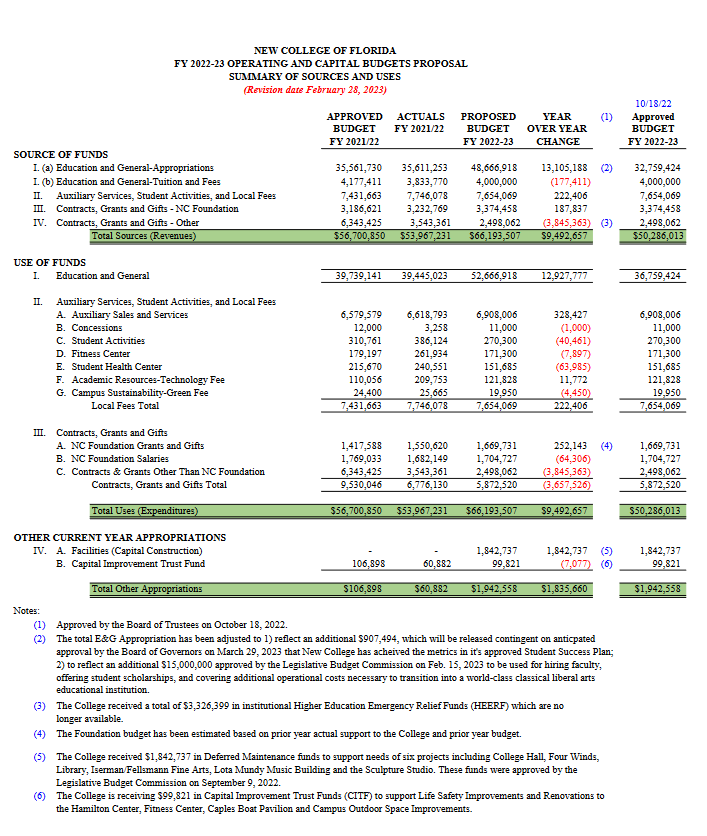
This budget was initially approved by a different set of trustees on Oct. 18, 2022, but due to a few additional contributions midway through the academic year, the BOT was required to adopt it once more. These contributions included $15 million approved by the Legislative Budget Commission for “authorized operation enhancements and scholarships as determined by the BOT and the President,” and an additional $907,494 awarded to the school by the BOG for successfully implementing the Student Success Plan. Kinsley clarified that the BOG will not approve the final report from this plan until March. 29, but since all initiatives from this plan were successfully fulfilled, he has preemptively factored it into the operating budget.
Additionally, $2.8 million were available to the college through the carry forward reserves from last academic year. The initial operating budget back in October had been $50.2 million, but with these additional funds, the total budget has been raised to $66.1 million.
Ruiz asked whether there will be the opportunity for these funds to immediately address issues with Information Technology (IT) infrastructure, WiFi stability, food insecurity and deferred maintenance on campus, “because they will affect the President’s goals of student recruitment pretty profoundly.”
Corcoran said that he would be willing to discuss this privately with trustees and wants to learn more about potential avenues of spending before he publicly announces anything. Ruiz clarified that she was not asking how Corcoran intends to spend this money, but if it can be spent on the things she had listed. He reiterated that he would rather wait to discuss this privately.
Ruiz then motioned to approve the operating budget, which was seconded by Keenan. It passed unanimously.
As soon as the motion passed and while Jenks was still speaking, Rufo interjected to ask Kinsley a question: “There’s been a lot of discussion in the media that New College has, since this transformation, been financially irresponsible.” He then asked whether New College is in better financial standing currently than it has been under previous administration, prompting laughter from both the trustees and the audience.
The accusations of New College being “financially irresponsible,” as Rufo put it, stem from the action of this board to award Corcoran a $699,00 salary plus benefits on Feb. 21.without a clear indication of where the money would be pulled from. Another issue is the school’s outstanding deferred maintenance, which remains unaddressed by the board.
Kinsley explained that the previous budget of $50.2 million had been implemented with “a very strict plan of austerity,” but the new budget of $66.1 million was “very helpful.”
“We have been very judicious in managing our resources in order to make sure that we are in a good financial position,” he clarified. “I would not by any means characterize our position as being in a financial emergency.”
“I would just like to note, especially for the reporters in the audience, that we are, according to our CFO, in significantly better financial shape than we have been in the past,” Rufo concluded.
The BOT then unanimously approved the 2022-23 Operating Budget. The meeting was adjourned shortly after.
The next scheduled BOT meeting will be held on Apr. 11. However, Jenks indicated that trustees should “keep your calendars available” for more virtual Special BOT meetings, specifically in order to discuss the New College Foundation.

